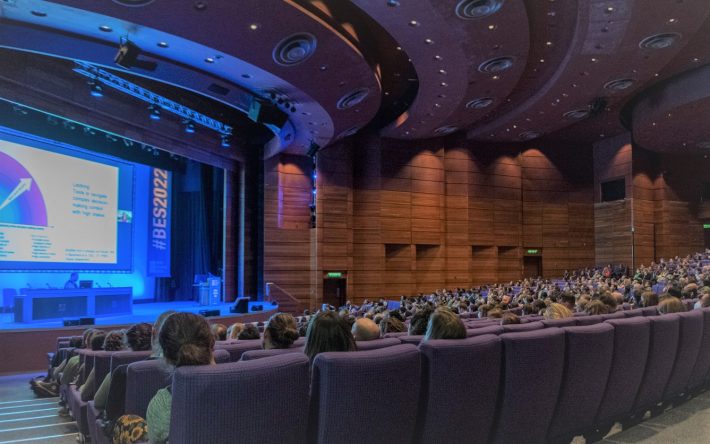Plenary speakers
Get to know the plenary speakers joining us at BES2024

At the core of our Annual Meeting are four internationally renowned plenary speakers. This year we are delighted to announce they will be:
Rob Fish – 12 Months in Ecology

Imperial College London
Rob Fish is Professor of Environmental Sustainability at Imperial College London. He is a social scientist and human geographer by training, with research interests in the social and cultural dimensions of natural resource management and a particular specialism in rural and agricultural environments. In recent years, Rob has played a prominent role in the elaboration of interdisciplinary approaches to the valuation of nature within environmental policy and decision making, co-leading the UKRI’s Valuing Nature programme. His recent graphic textbook on this topic, Valuing Nature: The Roots of Transformation, won the Taylor & Francis Outstanding STEM Book of 2021. Rob’s work is distinguished by its participatory and collaborative nature, as well as by direct intervention in the policy process. His experience in participatory methods includes experimentation in the use of public dialogue, citizen juries, deliberative polling and participatory modelling in a range of applied environmental contexts: water quality, food security, biodiversity and well-being. He is a founding lead editor of the BES journal People and Nature.
Ana Carnaval – The Tansley Lecture

City College of New York
Ana was born and raised in Rio de Janeiro, Brazil, where she obtained her undergraduate Biology degree and a Master’s degree in Zoology from Museu Nacional. She has a Ph.D. in Evolutionary Biology from The University of Chicago, being advised by John Bates at The Field Museum, and was an NSF-funded postdoctoral fellow in the Museum of Vertebrate Zoology at UC Berkeley, working with Craig Moritz. Ana has been teaching at the City College of New York since 2010, where she is now a Professor in the Department of Biology. Her research group studies spatial patterns of biodiversity and their underlying evolutionary and ecological processes, with the explicit aim of improving biodiversity prediction and conservation. Their projects focus on biogeography, historical demography, GIS-based distribution models, the combination of environmental data and paleoclimatic simulations, physiology, and genomics. Ana’s own work focuses in the Brazilian Atlantic rainforest, but her students have led studies in other Neotropical and North American biomes.
Lucy Waruingi – The BES Lecture

African Conservation Centre (ACC)
Lucy Waruingi is the Executive Director of the African Conservation Centre (ACC) a Kenyan-based NGO working in the East African savannahs for over 30 years. ACC’s aim is to conserve large open landscape linking knowledge, biodiversity and human wellbeing through programs that are anchored in cutting edge research, integrating local knowledge to innovative land governance approaches, and in initiatives that enhance local livelihoods in rich biodiversity areas especially in Kenya and Tanzania borderlands aera. Under her leadership, ACC has now been established as a conservation and knowledge hub coordinating collaborative research & biodiversity assessments, promoting tools and skills that support learning and practices for effective conservation actions that ensure ecosystem health. Lucy was co-ordinator for a national collaborative project in 2014 to develop the first Biodiversity Atlas for Kenya .
Lucy comes from the field of GIS & Remote sensing and has a long interest and over 20 years’ experience in mainstreaming science and biodiversity data, information and knowledge to influence natural resource management planning, policy formulation and decision making and action at local, national and global levels.
Nathalie Seddon – The Georgina Mace Lecture

University of Oxford
Nathalie Seddon is Professor of Biodiversity and Founding Director of the Nature-based Solutions Initiative in the Departments of Biology and Geography (Smith School for Enterprise and the Environment) at the University of Oxford. She is also Director of the Agile Initiative, co-lead of the Biodiversity and Society Programme and Leverhulme Centre for Nature Recovery, and is a Senior Research Fellow at Wadham College. In 2021, she co-founded the Oxford University Social Venture, Nature-based Insights of which she is non-executive Director.
Nathalie trained as an evolutionary ecologist at Cambridge University and has over 25 years of research experience in a range of ecosystems across the globe. As a University Research Fellow of the Royal Society, she developed broad research interests in understanding the origins and maintenance of biodiversity and its relationship with global change. Her work now focuses on determining the ecological and socioeconomic effectiveness of nature-based solutions to societal challenges, and how to increase the influence of robust biodiversity science on the design and implementation of climate and development policy.
Nathalie advises governments, UN agencies, and the private sector on nature-based solutions. She is a member of the Adaptation Committee of the UK Climate Change Committee, leading on nature; a member of DEFRA’s Science Advisory Council Biodiversity Expert Committee; serves on the Science Advisory Boards of Royal Botanic Gardens at Kew and sits on the Science & Knowledge Committee of the IUCN Global Standard for Nature-based Solutions. She is also Trustee of the Circular Bioeconomy Alliance. In 2022-2023, Nathalie was Academic co-Lead for the UK’s first People’s Assembly for Nature.
BES2024 Plenary Sessions are sponsored by:

Like what we stand for?
Support our mission and help develop the next generation of ecologists by donating to the British Ecological Society.